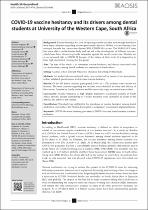| dc.identifier.citation | Potgieter, N., Kimmie-Dhansay, F., Meyer, A., Marais, S., Mansoor, I., Mkololo, Y., Maakana, M., Mhlongo, S., Makhoba, S. & Mhlanga, S. 2022, "COVID-19 vaccine hesitancy and its drivers among dental students at University of the Western Cape, South Africa", Health SA Gesondheid, vol. 27. | en_US |
| dc.description.abstract | Background: Vaccine hesitancy has seen an uprising over the decades, even though there have been many advances regarding vaccine-preventable diseases. Of late, vaccine hesitancy has resurged towards the coronavirus disease 2019 (COVID-19) vaccine. The SARS-CoV-2 virus has major effects on the human body and has led to the development of different vaccines, which have been shown to provide immunity against the novel coronavirus. Dentists are at an increased risk to COVID-19 because of the nature of their work. It is imperative to have high vaccination coverage for this group. Aim: The aim of this study is to determine vaccine hesitancy and drivers associated with vaccine hesitancy among dental students at a university in South Africa. Setting: A dental school in South Africa was chosen as the setting for this study. Methods: An analytical cross-sectional study was conducted by means of an anonymous, online, validated questionnaire to determine vaccine hesitancy. Results: Of the 205 dental students participated, 83.9% (n = 172) students were vaccine not hesitant. The main concerns regarding the vaccines were identified as safety and efficacy of the vaccine. Pressure by family or friends and the university to get vaccinated was evident. Conclusions: Vaccine hesitancy is high despite mandatory vaccination policies in South Africa. Specific drivers contributing to vaccine hesitancy were identified as doubt in the efficacy and safety of the vaccine. Contribution: This study has highlighted the prevalence of vaccine hesitancy among dental students at University of the Western Cape, prior to compulsory vacccination implementations. © 2022. The Authors. | en_US |

